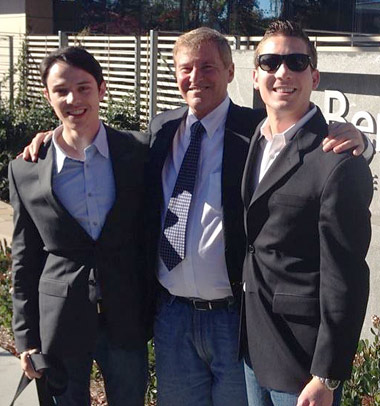By Andrew Cohen

Brokaw
’15
(right) with keynote speaker Leigh Steinberg ’73.
The timing couldn’t be better for the Berkeley Journal of Entertainment and Sports Law’s inaugural symposium April 11. Just last week, football players from Northwestern University won the first legal round of a historic quest to be classified as employees rather than student-athletes—which would let them unionize and alter dramatically the landscape of college sports.
In addition to that flashpoint topic, symposium panels will tackle two other timely issues: stadium development and fan-base territoriality for professional sports franchises; and copyright infringement in the digital age. Launched in 2012 as the law school’s first exclusively online journal, Entertainment and Sports Law teamed with the Sports Lawyers Association to plan the symposium.
Led by Editor-in-Chief Nathan Piller ’14 and Managing Editor Nick Brokaw ’15, the journal’s editorial board has assembled an all-star roster of legal experts. Legendary agent and Berkeley Law graduate Leigh Steinberg ’73—the inspiration for the film Jerry Maguire—is the keynote speaker. Other luminaries include Jack Bair, senior vice president and general counsel of the San Francisco Giants; Andy Dolich, former COO of the San Francisco 49ers and former president of the Golden State Warriors and Memphis Grizzlies; and Jill Lesser, executive director of the Center for Copyright Information.
“We want to address issues that are current and relatable to our student body and local community,” Piller said. “The overarching goal is not just to inform, but to encourage cross-fertilization of ideas to promote new strategies for handling these tough, hot-button issues.”
Berkeley Law Lecturer Roy Eisenhardt and Professor Pamela Samuelson will moderate the stadium and copyright panels, respectively. Brokaw said Eisenhardt, a former president of the Oakland A’s, “has been invaluable in helping us reach out to members of the sports law community.”
Piller and Brokaw also used their own connections to bolster the panel list. Piller’s former boss, Phil Gregory, represented the city of San Jose in an antitrust suit against Major League Baseball’s acquiescence to the Giants’ enforcement of territorial rights to the South Bay. Brokaw and Symposium Editor Zak Welsh ’15 tapped past employment with the Golden State Warriors and San Francisco Giants to land Bair, Giants’ deputy counsel Elizabeth Murphy, and Warriors’ special assistant to the president Billy Boidock.
They and other experts will address the ongoing territorial dispute between the A’s and Giants, the Warriors’ effort to build a waterfront arena in downtown San Francisco, and the legal and political challenges surrounding the NBA’s Sacramento Kings to stay in Sacramento.
Changing the score
“These are exciting times for students interested in sports and entertainment law,” Brokaw said. “We’re finally seeing a movement among law schools to recognize them as legitimate disciplines, worthy of study and scholarship. Lawyers in these fields tend to be exceptionally well-qualified, seasoned litigators and transactional attorneys.”
The landscape of college sports—an integral part of the culture on major college campuses such as UC Berkeley—is rapidly changing. Student-athlete unionization efforts are gaining steam, and a class of former and current college athletes was recently certified in a case against the National Collegiate Athletic Association.
Piller said the symposium aims to “help the sports law community at Boalt and in the Bay Area better understand these impending changes. It appears that legal reform of the amateurism model is inevitable and for that reason, thoughtful discussion becomes even more important.”
The copyright infringement panel will emphasize the importance of copyright law to protect creative efforts and encourage the production of new artistic expression.
“With the rise of online infringement, authorities are having to learn more about technology to improve enforcement and creators are having to cope with the fact that technological innovation may be outpacing legal protections,” Piller said. “Ultimately, intellectual property law must strike a balance between protecting creators’ rights and making creations available to the public. This panel seeks to flesh out the best way to strike that balance.”
Moving forward, journal leaders want to help Berkeley Law become one of the leading voices in U.S. sports and entertainment law.
“This law school has produced some of the biggest leaders in those industries, and we view the symposium as part of our journal’s entrance into the arena,” Brokaw said. “We’ve got a long way to go, but I think we’re well on our way.”